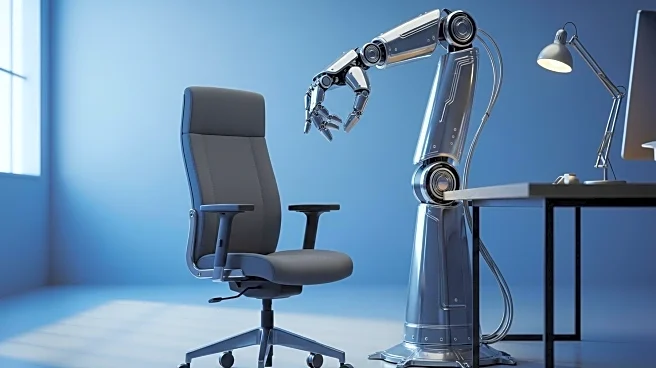What's Happening?
The rapid advancement of artificial intelligence is significantly altering the workforce landscape, particularly affecting entry-level jobs. A 2025 report highlights that AI is automating tasks traditionally performed by humans, leading to job cuts in major companies like Microsoft, Meta, and Google. This shift is creating a demand for new roles such as AI training specialists and ethical AI auditors, while traditional roles like administrative assistants face obsolescence. The market for upskilling platforms and alternative education models is expanding as workers seek to adapt to these changes. Companies like 360Learning and Docebo are leading the way with AI-driven learning management systems that offer personalized and scalable solutions.
Why It's Important?
The transformation driven by AI presents both challenges and opportunities for the U.S. workforce and education sectors. As AI continues to redefine job roles, there is an urgent need for reskilling and upskilling to bridge the skills gap. This shift is crucial for maintaining productivity and competitiveness in the global market. Investors are recognizing the potential in AI-powered platforms and apprenticeships, which are becoming essential infrastructure for the AI economy. These developments could lead to significant changes in public policy and educational frameworks, emphasizing the importance of AI literacy and human-centric skills.
What's Next?
The future of work will likely see increased collaboration between AI systems and human workers, necessitating ongoing adaptation and learning. States like Delaware are already positioning themselves as hubs for AI talent through partnerships and certifications. Public-private initiatives, such as Amazon's Project Kuiper, are expanding AI tools to underserved communities, addressing skill gaps and market disparities. As AI continues to evolve, the focus will be on integrating AI into curricula and fostering environments that support creative and judgment-based skills.
Beyond the Headlines
The ethical implications of AI in the workforce are profound, as automation challenges traditional notions of employment and productivity. The rise of AI ethics officers and customer experience analysts highlights the need for roles that require nuanced decision-making and creativity. This shift underscores the importance of developing education models that blend AI with human-centric skills, ensuring that workers can effectively interpret and collaborate with AI systems.









